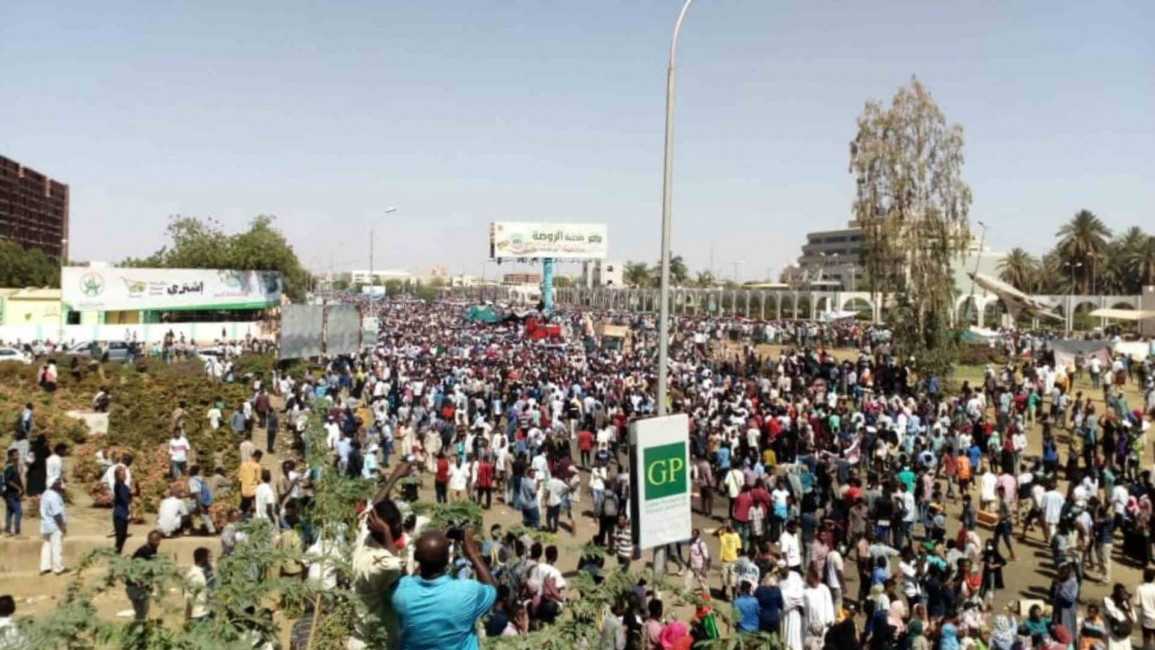Huge Sudanese protests held outside Khartoum army command as troops fire on crowds
Thousands of Sudanese protesters on Sunday are rallying outside the Army General Command in the capital Khartoum as a mass overnight sit-in continues into its second day.
Although the military allowed more than 500,000 people, according to witnesses, to gather outside the military headquarters on Saturday, the security services staged an attack on the demonstrators in the late afternoon.
"With the dawn of freedom and the continuation of our sit-in for the second consecutive day in front of the General Command of our glorious army, there are exposed plans from the security services and loyalists to the army leaders to disperse the crowds and empty the sit-in, but the crowds will withstand with the steadfastness of revolutionaries," stated the Sudanese Professionals Association (SPA), the main protest organiser since demonstrations erupted in mid-December.
|
|
The SPA also called on others to join the sit-in outside the General Command, as well as protests in other areas across Sudan.
Six people were killed on Saturday and Sunday in the early hours across Sudan.
Four men were shot during a brief window between 2 and 3am on Sunday morning when while attending the security services attempted to disperse the overnight sit-in in Khartoum with tear gas and live bullets.
Another man was killed in Omdurman on Saturday, and a woman was shot and killed by security forces at a refugee camp in Central Darfur.
The security services failed to disperse the sit-in, which has been ongoing since Saturday afternoon.
Protesters began setting up tents and tarpaulins to shield one another from temperatures of 40 degrees celsius on Sunday.
Some private companies arranged to deliver water, snacks and juice to the protesters, AFP reported, while protesters also rallied to collect money for water.
Alongside habitual chants, including "peace, justice, freedom" and "fall, that's all", protesters sang a newly coined tune in reference to the former Algerian President Abdelaziz Bouteflika, who was forced out of office on Tuesday by mass popular protests: "Bouteflika, Bouteflika! Oh Bashir - your turn is coming!"
|
|
Sudanese social media users began reporting on Sunday afternoon that the security services had returned to the area and started to fire on the demonstrators once more.
"Firing live bullets near the General Command now, 8-10 bullets," tweeted one witness at 4:45 local time. A few minutes later, another witness tweeted more than 50 bullets had been fired.
Another witness claimed the famed Land Cruisers of the security services had arrived and started "running over citizens".
Protesters had initially gathered outside the General Command to call on the army to join ranks with the protesters in demanding that President Omar al-Bashir, who seized power in a 1989 military coup, step down.
Despite worries that shows of solidarity with the protesters aims may be short-lived and not representative of the convictions of the upper ranks of the military, protesters could be seen riding on military vehicles and army personnel waved at demonstrators.
Just half an hour later, the witness said, protesters had closed off the street the security services were using to access the area with flaming tires.
Unconfirmed reports claimed army personnel had chased the security services out of the area adjacent to the General Command.
Later videos distributed on social media showed army personnel marching with demonstators.
Sudanese social media users continued to worry that shows of support by the lower ranks constituted the calm before the storm, and that a full-scale attack on the sit-in was impending.
At around 5pm local time, the Sudanese Ministry of Electricity declared a nationwide power blackout.
Sudanese social media users also reported that social media networks had been blocked again in the country, necessitating the use of a Virtual Private Network (VPN).
Unauthorised protests have been banned in Sudan since late February, when Bashir declared a nationwide state of emergency and granted increased powers to the security services.
Protests began in mid-December when a government decision to cut surpluses led to tripled bread prices, exacerbating the drastic financial situation of many in a country which many Sudanese say has been dogged by corruption, economic mismanagement and human rights abuses.
The protests quickly spread across the country and took on a broader political message - calling on Bashir to step down and allow the formation of a democratic transitional government.
Sudanese officials claim 30 people have died in protest-related violence - a tally which has not increased for more than two months - but activists say at least 66 have died. They also say some of those killed died under torture.



